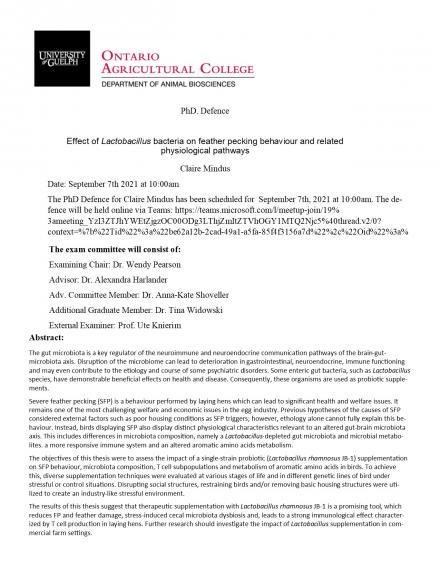Claire Mindus' PhD Defence
Date and Time
Location
Teams: https://teams.microsoft.com/l/meetup-join/19%3ameeting_YzI3ZTJhYWEtZjgzOC00ODg3LThjZmItZTVhOGY1MTQ2Njc5%40thread.v2/0?context=%7b%22Tid%22%3a%22be62a12b-2cad-49a1-a5fa-85f4f3156a7d%22%2c%22Oid%22%3a%22fbd28915-dda5-478f-8ecb-a3682dcf0c3a%22%7d

Details
The gut microbiota is a key regulator of the neuroimmune and neuroendocrine communication pathways of the brain-gut-microbiota axis. Disruption of the microbiome can lead to deterioration in gastrointestinal, neuroendocrine, immune functioning and may even contribute to the etiology and course of some psychiatric disorders. Some enteric gut bacteria, such as Lactobacillus species, have demonstrable beneficial effects on health and disease. Consequently, these organisms are used as probiotic supple-ments.
Severe feather pecking (SFP) is a behaviour performed by laying hens which can lead to significant health and welfare issues. It remains one of the most challenging welfare and economic issues in the egg industry. Previous hypotheses of the causes of SFP considered external factors such as poor housing conditions as SFP triggers; however, ethology alone cannot fully explain this be-haviour. Instead, birds displaying SFP also display distinct physiological characteristics relevant to an altered gut-brain microbiota axis. This includes differences in microbiota composition, namely a Lactobacillus-depleted gut microbiota and microbial metabo-lites. a more responsive immune system and an altered aromatic amino acids metabolism.
The objectives of this thesis were to assess the impact of a single-strain probiotic (Lactobacillus rhamnosus JB-1) supplementation on SFP behaviour, microbiota composition, T cell subpopulations and metabolism of aromatic amino acids in birds. To achieve this, diverse supplementation techniques were evaluated at various stages of life and in different genetic lines of bird under stressful or control situations. Disrupting social structures, restraining birds and/or removing basic housing structures were uti-lized to create an industry-like stressful environment.
The results of this thesis suggest that therapeutic supplementation with Lactobacillus rhamnosus JB-1 is a promising tool, which reduces FP and feather damage, stress-induced cecal microbiota dysbiosis and, leads to a strong immunological effect character-ized by T cell production in laying hens. Further research should investigate the impact of Lactobacillus supplementation in com-mercial farm settings.
Heat stress can negatively affect the growth performance of lambs. Heat stress thresholds for Temperature-Humidity Index (THI), at which points the bodyweight begins to decline, were determined for weaning weight and post-weaning gain in lambs. Heat stress functions, modeling THI beyond the threshold, were used as the environmental gradient for heat stress to examine possible genotype by environment interaction, using a reaction norm model. The results confirmed genetic antagonism between growth traits and heat tolerance. Hence, this antagonism needs to be accounted for in potential breeding programs. Variation in heritability esti-mates across the heat stress gradient provides opportunity for selection for growth traits within specific environments.